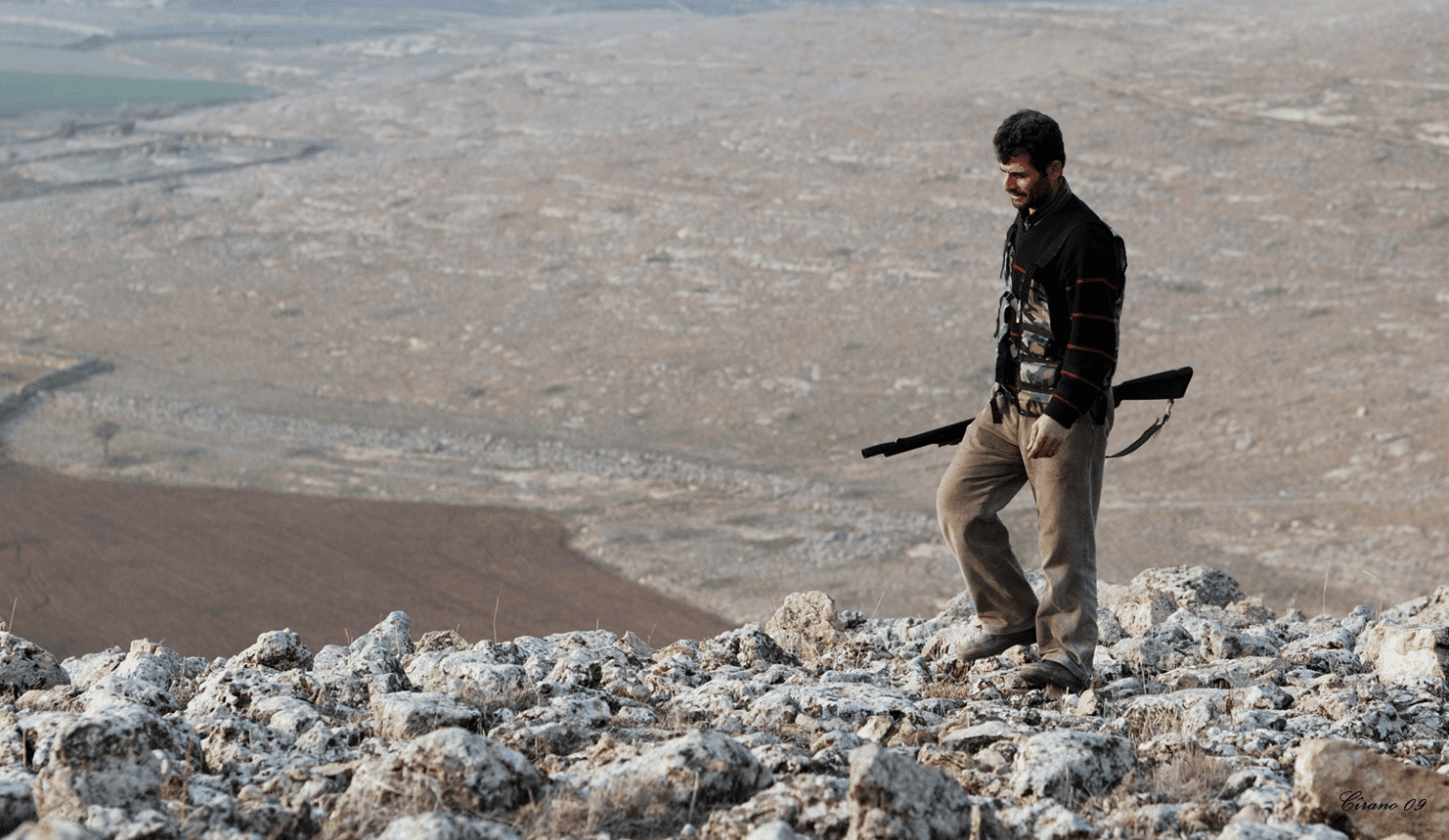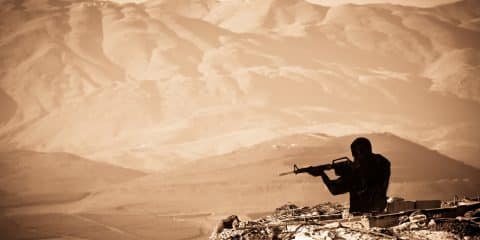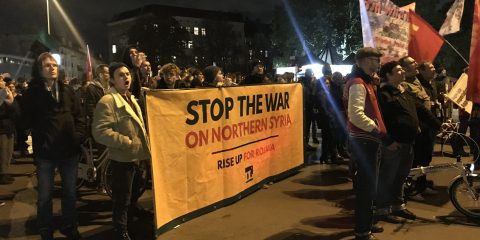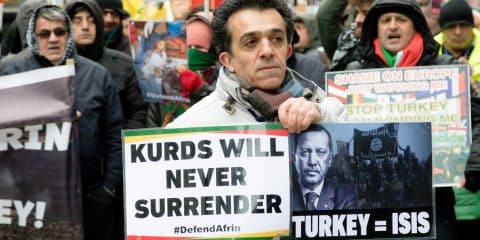Once again, Kurds are complaining of “betrayal.”
This time, it is in reaction to Sunday’s surprise announcement by the Trump White House that the US will effectively allow a long-anticipated Turkish incursion into northern Syria, pulling back American forces from the Kurdish-held area. The announcement was a profound disappointment for the Kurdish forces who had lost thousands of fighters battling ISIS alongside American troops, and who thought their sacrifice in the fight would guarantee a measure of protection against their Turkish adversaries.
Instead, Kurds again find themselves alone, abandoned by the state powers they thought were their long-term allies. “People here are owed an explanation regarding security mechanism deal, destruction of fortifications and failure of U.S. to fulfill their commitments,” tweeted a Syrian Democratic Forces spokesman. The SDF are dominated by the YPG, or People’s Protection Units, the heavily Kurdish militia with deep ties to the Kurdistan Workers’ Party (PKK), which Turkey has been battling for decades. Syrian Kurds fear a Turkish invasion will mean a drawn-out, bitter conflict that will take a bitter toll in Kurdish lives.
But the Kurds should not be surprised that powerful states do not stand by them forever, but instead repeatedly prioritize the interests of state actors in the region over those of the Kurds. This pattern has shown itself clearly over the past century.
The victorious Allied powers carved up the Ottoman Empire after World War I in the 1920 Treaty of Sevres, designating Kurdish areas of South-East Anatolia for a Kurdish state. But Turkish nationalist Kemal Ataturk led Turkish forces against the proxies of the Allied powers, forcing Allies to scrap the treaty. The new Treaty of Lausanne, signed in 1923, had no provision for a Kurdish state.
The Iraqi Kurds under Mulla Mustafa Barzani fought a series of uprisings against the Iraqi government in the 1960s and 1970s. Major regional and world powers supported this effort. Iran backed the Kurds in order to pressure Baghdad into surrendering disputed border territories. Israel sent advisors and arms in order to bleed the Iraqi army and keep them from deploying in Arab-Israeli wars. And the United States sought to weaken Iraq, a Soviet ally, and to help the Shah. But Iran never wanted the Kurds to win. It only wanted to keep the flame of conflict lit long enough to bring Iraq to the negotiating table. Once Iraq gave Iran what it wanted, there would be no need for the Kurds.
That is exactly what happened. In 1975, Iraq and Iran reached an American-sponsored (Kissinger) agreement over the border, and Iran abruptly pulled its support. What’s more, the Shah prevented all Israeli aid from reaching Barzani’s forces as well. Suddenly without allies, the Kurdish rebels were forced to flee, leaving Saddam Hussein to take his revenge on the Kurds.
“Our movement and people are being destroyed in an unbelievable way, with silence from everyone,” complained Barzani to Secretary of State Henry Kissinger. “We feel, Your Excellency, that the United States has a moral and political responsibility towards our people, who have committed themselves to your country’s policy.”
The protests fell on deaf ears in Washington. “Covert action should not be confused with missionary work,” remarked a senior American official.
In 1988, Saddam’s forces attacked the Kurdish city of Halabja with chemical weapons, killing thousands. The Reagan Administration initially blamed Iran, as it backed Iraq in its war against the Islamic Republic. The Saddam regime rightly calculated that it could get away with murdering its own citizens.
Turkey fought a bitter counterinsurgency against the PKK in the 1980s and 1990s. Israel drew close to Turkey during this period, and Turkey bought Israeli military hardware to use in its fight against the PKK. Israeli advisors were stationed in Turkey to support their use of Israeli-made Heron drones against the PKK in 2010. This was seen as a betrayal by many Kurds. “It hurts. It hurts us,” said a female YPJ commander to Israeli journalist Itai Anghel.
The Kurds wholeheartedly supported the 2003 invasion of Iraq to oust their bitter enemy Saddam Hussein, and Kurdish forces fought alongside American troops in northern Iraq. But by 2007 the Bush Administration accepted air strikes by Turkish planes on PKK strongholds in Iraq.
In September 2017, the Kurdistan Regional Government in northern Iraq held an independence referendum, which passed overwhelmingly. The US joined Turkey, Iran, and Iraq in opposing the measure. In response, Iraqi forces attacked Kurdish-controlled Kirkuk, backed by Shiite militias. Iraq, Iran, and Turkey took measures to punish the KRG, with no major protest from Western powers.
In 2018, Turkey invaded the Afrin district in Syria in order to drive out PKK and YPG force there. The US affirmed Turkey’s concerns and effectively let them drive the YPG out of the Kurdish-majority district.
The record of betrayal should offer some clear and harsh truths for the Kurds. Other countries will continue to prioritize the interests of major regional powers like Turkey and Iran over those of the Kurds. Foreign powers will use the Kurds as effective proxies as long as it serves them, then will abandon them when their interests dictate a change of heart. Just because Kurdish fighters sacrificed themselves to defeat ISIS does not mean the US will remain by their side for years to come.
So what are the Kurds to do? First, the various factions must reduce intra-Kurdish fighting and stop siding with outside countries in order to harm Kurdish rivals. Second, Kurdish leaders should look to Israel as an example. Israel’s military might, on full display in 1967, convinced American leaders of its usefulness as an ally against Soviet clients. A unified Kurdish military force in the Kurdistan Region of Iraq is a necessary first step to developing independent military might. Then Kurdish forces have to go through the long process of transforming the peshmerga from party militias commanded by members of leading families into a truly national army with officers chosen by merit alone. In time, Kurdish forces must begin to develop an indigenous weapons industry, and not rely entirely on the good graces of patrons whose interests do not align with the Kurds.
Diplomatically, Kurdish representatives must cultivate deep support among both US political parties. In addition, they must more forcefully make the case that increased Kurdish autonomy, and ultimately independence, would serve Western interests more than catering to Ankara and Baghdad.
The Middle East is a challenging environment for minorities to survive. They must be willing and able to fight, and they must convince a powerful patron that their survival is in the patron’s interest. The Kurds have had ample opportunity to learn these lessons; the sooner they do so, the sooner they can begin the hard work of building sustainable power in pursuit of their goals.
“The Kurds have no friends but the mountains,” goes the Kurdish adage. For the foreseeable future, that is true, and they would be well served to begin acting accordingly.
JISS Policy Papers are published through the generosity of the Greg Rosshandler Family.
photo: Dûrzan cîrano [CC BY-SA 3.0]








 - בניית אתרים
- בניית אתרים